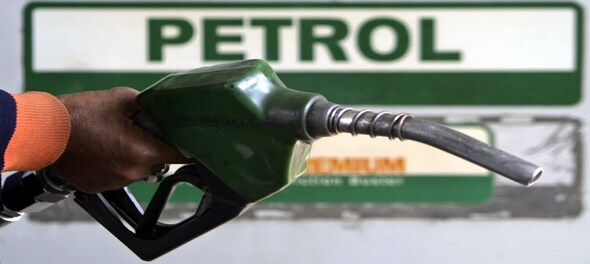
Brent crude hit the $70 per barrel mark, underlining a strong comeback for oil prices nearly a year after one of the crude benchmarks (WTI) fell bizarrely into negative territory.
While the rise in crude is a signal of a bounceback in the global economy, it presents a new headache for India: It severely tests the government’s strategy of bolstering its revenues through steep taxes on fuel retail.
Petrol prices have topped Rs 100/litre in multiple cities, following a steady increase over the past few years, attributed mainly to excise duty hikes taken by the Centre, besides increase of value added tax (VAT) by states. Between 2014 and 2021, excise duty on petrol has soared by 348 percent, from Rs 9.48 per litre to Rs 32.98.
In fact, between excise duty and VAT, taxes now make up as much as 60 percent of the amount consumers pay at the pump.
The spotlight on the fuel tax regime became more conspicuous over the past year as the COVID-19 lockdown walloped the economy and shrank the government's traditional sources of revenue.
In Budget 2020, presented a month before the lockdown in March 2020, the government said it hoped to earn Rs 2.67 lakh crore from excise duty in FY2021. However, with its income from chief sources such as corporate tax, income tax and GST coming in anywhere between 25 percent and 35 percent lower than forecast, the government had to rely on excise duty on fuel to make up for part of the shortfall, mopping up Rs 3.61 lakh crore.
Taxes on fuel are an easy source to earn revenues as fuel is a fairly inelastic commodity – meaning a rise in price does not cause a fall in demand to the same extent – and being outside the ambit of GST, the Centre and states are free to take their own decisions.
But with crude prices rising again, governments are obliged to provide relief to citizens, says Kakali Mukhopadhyay, Professor of economics at Pune-based Gokhale Institute of Politics and Economics.
Mukhopadhyay points to the recent spate of VAT cuts brought in by states, which are headed for assembly elections in a few months. "This shows that there is scope for intervention," she said.
Excise duty on fuel is "ad valorem" in nature, meaning it is levied as a percentage of the value of the item instead of a fixed unit like litre or kilo. This means that every rise in the base price of fuel will have a corresponding increase in the tax levied.
High fuel prices are no longer the political hot potato as they used to be in 2013, despite the fact that the erstwhile UPA government used to keep a tight leash on prices by subsidising what consumers paid and keeping prices contained even when -- for instance -- crude prices crossed the $100 per barrel mark.
Compared to the UPA's mollycoddling of consumers, the NDA government's approach seems to have swung to the other end as it first did away with subsidy on diesel, a bold reform once thought to be too unpopular to implement -- and has now used fuel to bolster the exchequer's revenues.
Experts, however, suggest that after deregulation, time is now ripe to bring in a final set of reforms when it comes to fuel -- bringing it under GST.
When GST was introduced in 2017, petroleum products (crude, petrol, diesel, natural gas and aviation turbine fuel) were kept outside of its purview, as state governments were reluctant to let go control of a cash-cow commodity.
In a recent interview with CNBC-TV18, SBI Group Chief Economic Advisor Soumya Kanti-Ghosh said that the government should consider bring petro products under GST. The Centre has already indicated its line of thinking after stating that it was committed to bring natural gas under GST.
The question will remain on whether states will agree and allow petrol and diesel to be taxed under GST. For instance, a CARE Ratings report recently pointed out that VAT on petroleum products is 40 percent in Maharashtra and several states, especially ruled by opposition parties, were busy slugging it out with the Centre last year accusing it of not making good their losses arising from the GST rollout.
At the recently held CNBC-TV18's 16th India Business Leader Awards, Finance Minister Nirmala Sitharaman said that the central government is not ready with a plan yet when it comes to bringing fuel under GST.
But until there is a plan, the Centre has its task cut out: While the fuel price rise may not seem to cause any political problem for the government, Mukhopadhyay said that its impact will rear its ugly head through economics by way of inflation and an inflated import bill.
(Edited by : Nazim)
First Published: Mar 9, 2021 8:32 AM IST
Check out our in-depth Market Coverage, Business News & get real-time Stock Market Updates on CNBC-TV18. Also, Watch our channels CNBC-TV18, CNBC Awaaz and CNBC Bajar Live on-the-go!


Lok Sabha Elections 2024 | Assault allegations or political accusations— what's Swati Maliwal controversy all about
May 19, 2024 2:25 PM
Phase five Lok Sabha polls: Rae Bareli, Amethi among 14 UP seats going to polls on Monday
May 19, 2024 1:03 PM
AAP protest walk: Arvind Kejriwal challenges BJP to arrest entire party, Delhi Police imposes Section 144
May 19, 2024 12:26 PM
Terror attacks in Kashmir raise concerns ahead of May 20 and May 25 election
May 19, 2024 12:15 PM

